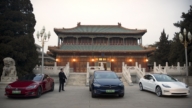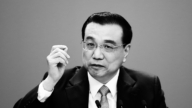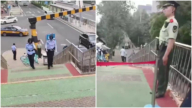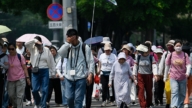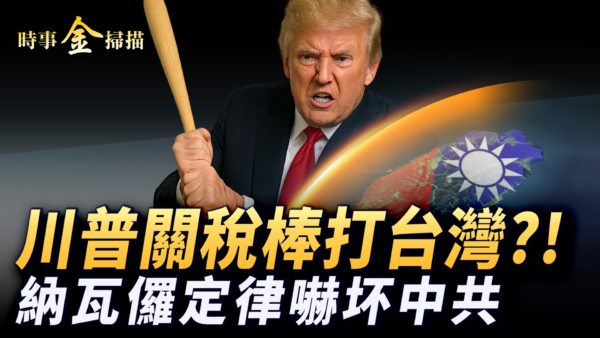【新唐人2013年02月28日讯】中央“两会”开幕前夕,新一届国务院机构调整方案成为焦点。铁道部与交通部合并一事,据传已经基本敲定。不过,这一改动可能需要四到五年时间才能逐步完成。分析指出,众多理由促使李克强挥刀斩“铁老大” ,不过,李克强操刀改革,不仅要有破局之胆,也要有破局之智。
中国大陆《第一财经日报》27号报导,虽然没有官方定论,铁道部并入交通部的消息已在整个铁路系统不胫而走。而且,微博上,具有身份认证的人士更透露,铁道部和交通部门合并后,改名为“公路铁路航空水路交通总部”。
稍早前,《第一财经日报》还报导说,根据机构改革步骤,从制定计划到实施部门、和人员的调动,少则需一两年,多则四、五年才能完成。不过,在两会公布方案之前,仍存在变动的可能。另外,由于涉及人员数目庞大,消息人士指称:“后续的工作将是繁重艰钜的”。
据了解,铁道部作为一个“独立王国”,长期以来备受诟病。这个“铁老大”是目前国务院政府机构中唯一实行“政企合一”、兼负“政、企”双重职能的部门,是一个集监管者和被监管者、投资方和建设方、工程监理和建设者于一体的机构,甚至铁道部还有自己的公安局、检察院和法院。
时事评论员汪北稷指出,铁道部是个腐败、专制的军事化机构,多年来,一直受到谴责。
时事评论员汪北稷:“铁道部是中共独裁性、腐败性、专制性的一个高度的浓缩,对人民大力的说是准军事化管理,战略意义。实际上在中国人痛苦的春运当中,扮演着一个极不光彩的角色。(铁道部)发展所谓的高速铁路的时侯,发生前年一个铁路的重大事故,给人民留下一个恐惧的印象—-盲目的高速发展。所以这个部门留给中国的是个负资产。”
早在2008年,时任总理的温家宝,曾对国务院部委和直属机构进行一轮名为“大部制”改革的撤并,计划将铁道部并入交通部。但是,当时遭到时任铁道部部长的刘志军强力反对而受阻。随着刘志军因贪腐下台,中国各界对铁道部改革的呼声愈来愈高。
时事评论家文昭:“前几年‘高铁大跃进’当中,大量的资金投给他(刘志军),整个对资金的管理缺少透明、缺少监督,产生了非常严重的腐败案件。刘志军跟江泽民是有一定关系的,就是他能够在铁道系统里边比较迅速得到提拔。”
《第一财经日报》的报导指出,由于大量高铁项目上马,铁道部已经巨债缠身。截至2012年三季度,铁道部负债26,607亿元,资产负债率达61.81%。而同一时期铁道部税后亏损85.41亿元。这是未来铁路改革推进面临的棘手难题。
报导引述“北京交通大学经管学院”教授荣朝和的分析指出,铁路改革应包含三项涵义:一是机构改革,就是铁道部并入交通部;二是政企分开,把铁路的运营、建设职能剥离,运营部门从铁道部中划分出来,成立铁路运输总公司,再根据“网运分离”或者“区域分割”的理念,切割成不同的板块和部门,使铁路主管部门只具有公共服务和行业指导的职能。三是解决铁路债务问题。
习、李自从“十八大”上位后,就向全国发出了加快改革、攻坚克难的动员令。多方消息证实,这次“大部制改革”将由李克强亲自操刀。海内外舆论也在关注习、李的改革决心。有海外评论人士指出,铁道部和交通部的改革,将是判断习、李改革力度的标志之一。而李克强操刀改革,不仅要有破局之胆,也要有破局之智。
采访编辑/常春 后制/黎安安.
China’s Ministry of Railways To Be Reformed
On the eve of Chinese Communist Party(CCP)’s Two Sessions,
the restructure of State Council ministry and agencies has
become the public focus.
The merger plan of the Ministry of Railways with the Ministry
of Transport was rumored to have been finalized.
Reportedly, it will take about five years to complete.
Multiple reasons have led to the cut off the Ministry of Railways.
Li Keqiang, who will take charge of the restructure, shall
have both courage and wisdom, according to the comments.
On Feb 27, China’s First Financial Daily reported on
a rumor that has circled the entire Railways sector.
It is about the Railways Ministry’s incorporation with
the Ministry of Transport.
A netizen under real-name revealed in his micro-blog that
the merged new ministry will be named:
“Road, Rail, Aviation & Water Transportation Headquarters”.
Earlier on, the newspaper reported that it may take one
to five years to finish the merger.
The whole procedure ranges from finalizing plans to
personnel appointment.
Before the CCP Two Sessions in which the merger will be
officially announced, the plan remains variable, said the report.
Since the scheme will involve a great many personnel,
sources have said that “the follow-up work will be arduous”.
Over past years, the Railways Ministry, like a separate
kingdom, has been under heavy public criticism.
It is the sole state department that combines government
function and enterprise management.
Also, it is an integration of regulator and regulated,
and of investors and construction contractors.
The Railways Ministry even has its own public security
administration, procuratorate and courts.
Critic Wang Beiji says that the Railways Ministry is
a paramilitary agency.
Over the years, it has been blamed for corruption and
autocracy.
Wang Beiji: “The Railways Ministry is a high concentration
of the CCP dictatorship, corruption and autocracy.
Chinese citizens are under its paramilitary management.
During the Chinese New Year travel rush,
it has played an inglorious part.
When its so-called high-speed rail development
went into overdrive in 2011, Wenzhou saw a grave high-speed rail crash.
This taught the public that the development plan pursued
the goal of high speed quite blindly.
So it is that this state department has what
is viewed as negative equity.”
In 2008, Premier Wen Jiabao planned to restructure
the ministries and agencies under the State Council.
That included an incorporation of the Railways Ministry
with the Ministry of Transport.
Yet, it was blocked by strong opposition from Liu Zhijun,
the railway minister at that time.
After Liu was sacked for corruption, the public voice calling
for a reform of the Ministry of Railways increased.
(Critic) Wen Zhao: “The CCP authorities injected vast capital
into high-speed rail development several years ago.
But management of that capital lacked transparency and
oversight, which led to many major corruption cases.
Liu Zhijun had connections with Jiang Zemin, so he got
promoted quickly inside the railways sector.”
The First Financial Daily reported that the Railways Ministry
has been hugely debt-ridden.
As of the third quarter of 2012, the department had liabilities
of over 2660 billion yuan, with asset/liability ratio at 61.81%.
In the same period, after-tax loss exceeded 8.5 billion yuan.
It has become a ticklish problem for future railway reform.
The report quoted Rong Zhaohe, a professor at
Beijing Jiaotong University.
It said that the railway reform should cover three layers:
1. Institutional restructure: the merger of the Railways
Ministry with the Ministry of Transport;
2. the separation of functions of governance
from enterprise management.
That is, separating railway operation and construction
from the Ministry, and setting up a railway transport corporation.
The ministry in charge of railways will only serve
a role of public service and industry guidance.
3. The steps to be taken for solving debt problems.
Xi Jinping has openly spoken about the speeding up of
reform, soon after taking office.
Multiple sources have confirmed that Li Keqiang will
be in charge of this “big-ministry reform”.
The Xi-Li leadership’s resolve in carrying out reforms has
been closely followed by Chinese and foreign media.
An overseas commentator says that the reforming of
the Railways Ministry and the Transportation Ministry
will help to evaluate the Xi-Li ‘s team’s reform resolve.
Li Keqiang shall display both courage and wisdom,
according to comments made.


